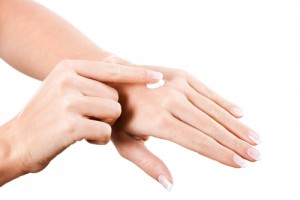 The initial approach to treat any grade of radiation dermatitis, involves protection of the affected area from further radiation and promote comfort in the same. Use of alcohol based products (deodorants, perfumes) irritants with an alpha-hyroxy-acid (AHA) base, creams with a jelly or greasy base, should be avoided, and the affected area should be compressed with saline at least twice daily. It is also important to let the affected area ‘breathe’ and hence use of adherent dressings, tight and synthetic clothing should be avoided. Sun protection is equally important and the use of a sunscreen (SPF 30 ideally) is a must. The use of epilators and wax for hair removal is prohibited during this time, and if urgent, the use of an electric razor is advised.
The initial approach to treat any grade of radiation dermatitis, involves protection of the affected area from further radiation and promote comfort in the same. Use of alcohol based products (deodorants, perfumes) irritants with an alpha-hyroxy-acid (AHA) base, creams with a jelly or greasy base, should be avoided, and the affected area should be compressed with saline at least twice daily. It is also important to let the affected area ‘breathe’ and hence use of adherent dressings, tight and synthetic clothing should be avoided. Sun protection is equally important and the use of a sunscreen (SPF 30 ideally) is a must. The use of epilators and wax for hair removal is prohibited during this time, and if urgent, the use of an electric razor is advised.
Use of a more absorbent material for dressing (cotton and soft mesh gauze), use of water based solutions as topical therapy and using hydrocolloid solutions or hydrogels to control drainage (they form a moist covering over the wound bed and help in maintaining a moist yet unaffected wound environment), analgesics for pain relief are some of the routine practices encouraged to keep the affected area free of any kind of stress and allow simultaneous healing. It should be kept in mind to cover up the wound in some way to seal the nerve endings and reduce pain and discomfort. Hot water ‘sitz’ bath might be useful in relieving some discomfort, especially for people receiving radiation therapy for perineal or rectal cancer (non-perfumed soap is to be used for bathing).
Since inflammation is another major aspect of this condition, use of corticosteroid creams might be prescribed by the physician depending on the need. However, it should be kept in mind to use the same only if prescribed, due to various other risks involved, like, masking the effects of any suspected skin infection, which could eventually worsen the radiation wound rather than healing and prolonged application of corticosteroids pose a threat of reduced blood flow to the skin and cause problems.
Appropriate precautionary antibacterial therapy is also prescribed in most cases. Silver sulfadiazine cream is one of the more commonly prescribed ointments in this case. People with an allergy to sulphur, pregnant women and patients with hepatic disease should avoid using the same. In patients with suspected neutropenia and fever, the common choices of antibiotics include penicillins (against gram positive bacterial infections) and quinolones, cephalosporins or aminoglycosides for gram negative bacteria. It should be noted that children should not be prescribed quinolones, and a confirmatory test is always needed for suspected penicillin allergies.
Most physicians stress upon moist healing as the pivotal technique to combat radiation burns. Moist healing forms a very important part of the treatment regime, because moisture is needed for cells to grow and repopulate the affected area, form new tissues and ensure supply of nutrients and minerals to the same to enhance the process. The wound exudates serve as the connective media to ensure the equal spread of growth factors, hormones, nutrients over the affected area, enhance epithelial growth promoting scab formation to ensure safe and healthy closing of the same, and provide the immune cells with the ability to combat with foreign pathogens, bacteria and necrotic tissue, reducing infections.
For severe conditions requiring immediate hospitalization (those involving deep tissue necrosis and ulceration), skin grafting (cosmesis) is the best option.
Nutritional needs should be monitored for older patients, as it helps in boosting the wound-repair system of the body.
Regular checkups and adherence to the routines suggested by the physician and the radiation department would eventually help in complete recovery of the condition.
Note: Radiation Therapy News is strictly a news and information website about the disease. It does not provide medical advice, diagnosis or treatment. This content is not intended to be a substitute for professional medical advice, diagnosis, or treatment. Always seek the advice of your physician or other qualified health provider with any questions you may have regarding a medical condition. Never disregard professional medical advice or delay in seeking it because of something you have read on this website.
